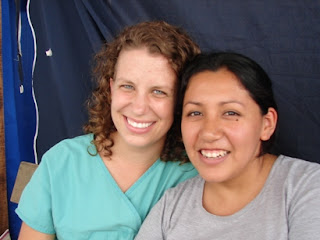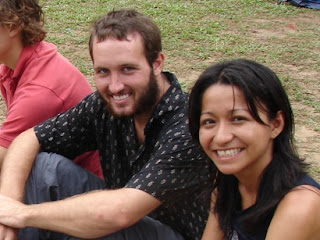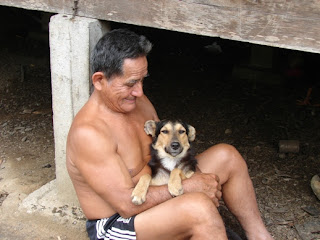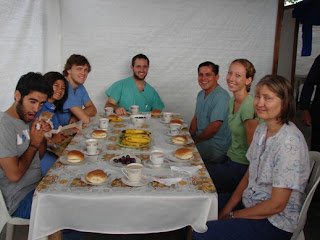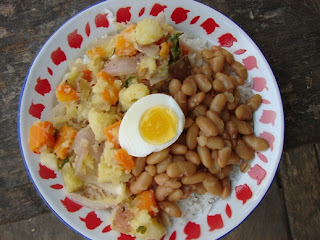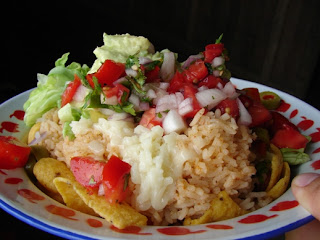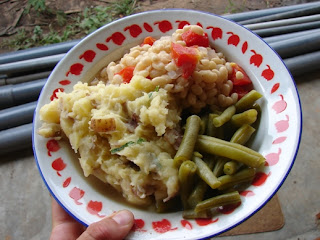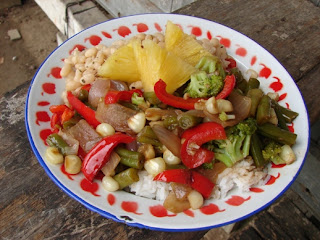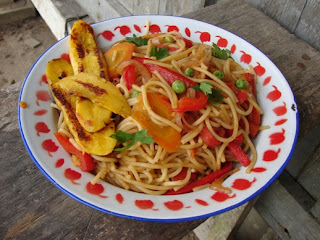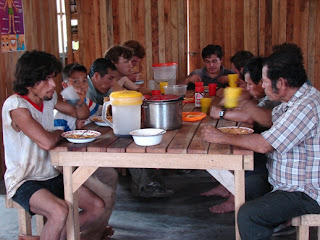(This experience happened awhile ago-I think last November-but we still laugh about it now).
We left the house at 8:00 in the evening, all dressed up and ready to attend the wedding with Fredde. Anthony, Karen and I paraded behind her as we hiked out to the street. Fredde had told us earlier that the event was to be held at the Adventist high school in downtown Pucallpa, and Karen and I weren't listening to her as she gave our moto driver directions.
The two of us climbed into the moto and took off. "Wait for us!" Fredde yelled after us, but our driver paid no attention. He drove off into the dark and dusty night.
He didn't drive in the direction of town. In fact, he drove in the opposite direction. He took us down a dark road we weren't even familiar with. I looked at Karen--what was going on? I leaned forward and yelled at the driver over the roar of the motor, "¿Donde vas?" He kept going. I hollared again, "Where are you going?"
The moto slowed, then stopped. "I'm taking you to Yarina Cocha," he said, "Near the hospital."
We were totally creeped out. "No," Karen told him, "We're going to the Colegio Adventista, in Centro."
More confusing hollaring and arguing ensued as motos and motorcycles whizzed around us. Finally the driver peered about, scoped out the situation, and finally turned back around.
Several minutes later we found ourselves in the outskirts of Pucallpa, but it was part of town where we'd never been before. "Does he know where he's going?" Karen asked.
I grabbed her arm. "Let's pray!" I said.
We prayed for God's protection, then quietly made an escape plan, if the situation became too sketchy.
We drove around for ten minutes more, then we praised God when we finally arrived at the gate of the Adventist school. We paid our driver and hurried in, expecting to see Fredde and Anthony waiting for us.
A group of moms were playing volleyball in the courtyard. There weren't signs of a wedding anywhere.
"Well," I said to Karen, "No one at this wedding knows us, so it won't be a great loss if we don't show up at all."
I was trying to be funny, but Karen was not amused. Where on earth was this wedding? We asked around, and the volleyball moms gave us funny looks. We were still creeped out from that moto ride-who knows what that driver was up to.
We found a church member we knew, watching the games. "Can we use your cellphone?" Karen asked him.
"Where are you, little sisters?" Fredde yelled into the phone when we reached her.
"No, where are YOU?" Karen asked back.
"We're at the Adventist church in Yarina Cocha, near the hospital." said the annoyed Fredde.
We groaned. Our driver had been headed in the right direction, after all. Karen had misunderstood Fredde about the Colegio part. The couple had studied at the Colegio, but it wasn't the wedding location. Oh the frustrations of the language barrier!
We smoothed out our ruffled feathers, thanked the brother from church, and hailed another moto driver. We set off for Yarina Cocha, only a little more than fashionably late.

